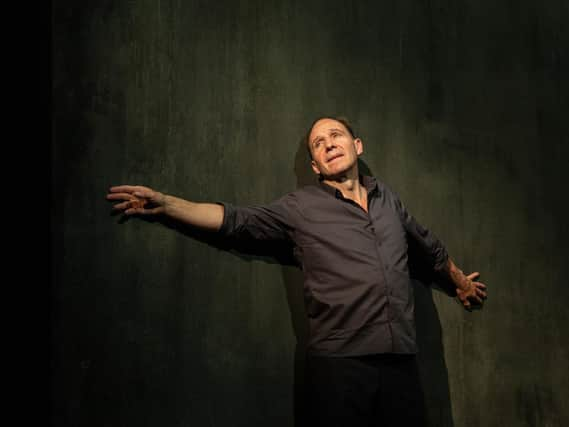'A show unlike any other': our review of Ralph Fiennes on stage in Northampton in Four Quartets


The gravitas of actor-director Ralph Fiennes is palpable as he steps sombrely onto the stage immediately silencing the simmering audience.
In a bold post-pandemic move, the Hollywood star has decided to direct and perform an 80 minute abstract monologue, as masked spectators return to theatres.
Advertisement
Hide AdAdvertisement
Hide AdFour Quartets is a recital of T S Eliot's thousand-line mediation on time.
Written between 1935 and 1941 as Eliot weathered the grief of the Second World War, the poignant yet paradoxical poem is beguiling and bemusing in equal measure.
Weaving together Eastern mystical enlightenment with Christian sermons, the text philosophises about the passage of time, love and loss with giddying effect.
Despite its creation almost a century ago, the timeless quality of Eliot stands the test of time, with Fiennes knowingly delivering the line "Not here in the darkness, in this twittering world".
Advertisement
Hide AdAdvertisement
Hide AdDivided into four poems beginning with Burnt Norton, a house in Gloucestershire, the work intertwines conjecture, history and ancient Indian texts with the grounded reality of place orbiting the English rose. East Coker, a village in Somerset, the Dry Salvages off the coast of Massachusetts and Little Gidding in Cambridgeshire where Charles I took refuge in 1646 after the Battle of Naseby, complete the quartet.
Fiennes is a pure tour de force, proving his mettle as one of Britain's finest actors as he recites the extensive, opaque text without a single stutter or stumble.
What could have been a dry Sunday school reading is transformed into a captivating solo performance iridescent with light and shade. His roaming eyes ensure Fiennes engages with each audience member on an individual level as the motifs mount up.
The structure evokes the seasons, the elements and the four ashramas (age-based life stages discussed in Hindu passages) but the text and stage production is also strewn with duality. Stillness and movement, time and timelessness, life and death, dazzling light and pitch black, love and suffering.
Advertisement
Hide AdAdvertisement
Hide AdEliot himself observed that the meaning of the poem "is not exhausted by any explanation", leaving readers to decipher it as they wish.
It is fitting then, that the set and costume design by Hildegard Bechtler is minimalist in form with two slabs looming large over the stage like towering gravestones. Similarly Christopher Shutt's sound design is stripped back to sparse moments of waves crashing, children laughing and flames flickering.
At times the text is frustratingly contradictory eulogising time the destroyer and time the preserver in a whirlwind of impenetrable poetry.
Whether audiences are ready for such a bleak intellectual battering after a year of unprecedented trauma remains to be seen, but it cannot be denied that this is a show quite unlike any other.
* Four Quartets runs until June 12. Visit royalandderngate.co.uk to book.